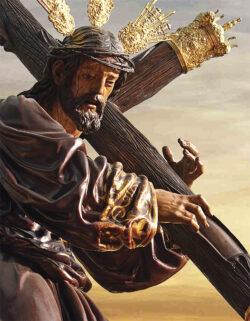We must accept that suffering and the Cross, however dark they may appear, contain deep within them a divine smile and a kind of resurrection, a radiance and a glory.
Newsroom (01/04/2022 15:57, Gaudium Press) To eliminate suffering from our lives is impossible, but it is also certain that God never demands something beyond our strength: “Deus qui ponit pondus, supponit manum – God, who places the weight upon us, also places His hand beneath us,” says the proverb.
Pain exists both in the way of holiness and in that of sin; in the former it is always gentler, and in the end all suffering well endured gives way to triumph, as St. Alphonsus Mary of Liguori reminds us:
“Suffering is necessary; we must all suffer. Everyone, whether just or sinners, must carry the cross. Whoever bears it patiently is saved, and whoever bears it impatiently is condemned. [Whoever humbles himself in tribulations and resigns himself to God’s will is grain for Paradise, and whoever is proud and angry, abandoning God, is chaff for hell.”
So great is the glory that awaits us in eternity, in the joy of the beatific vision, that it justifies all the sufferings that may befall us. In the words of the Apostle: “the sufferings of this life are not in any proportion to the future glory that is to be manifested to us” (Rom 8:18).
If God is for us, who can be against us?
When a tragedy or failure that we do not understand befalls us, let it be a cause for rejoicing, because it indicates that we carry in our soul the sign of those who were predestined:
“As God has treated His most beloved Son, so will He treat those whom He loves and adopts as His children.”
Dilemmas, disappointments, misunderstandings, health setbacks, family misunderstandings, financial difficulties or disasters are permitted by Providence for our own good.
That is why St Paul asks: “If God is for us, who can be against us? God, who did not spare His own Son, but gave Him up for us all, how could He not give us everything together with Him?” (Rom 8:31b-32).
“Everything” also includes pain. Let us therefore be filled with joy as we journey throughout this Lent, step by step, towards the Crucifixion of our Lord Jesus Christ. Confident that Providence never abandons us, let us abandon ourselves entirely into her hands – like Abraham and the God-Man himself – so that she may do with us what she wills.
Obeying God’s will
God expects this sacrifice from each one of us: detachment from what leads us astray, or from any apprehension that ties our heart to something other than Him, and docility to His will.
Since He has called us to holiness, He wants us whole and entire, and desires us to constantly have our cleaver raised like Abraham. If Abraham was willing to give up Isaac, how can we not be ready to give up that which is an obstacle to salvation and to our perfect relationship with the Lord?
How profitable it would be for us to make an ardent resolution to lay each of our caprices on the wood, to put the knife to them, and then to set them on fire and burn them as a burnt offering to God!
In this way, like Abraham, we would become free from any inordinate fondness for creatures. What a consolation it would be to be able to hear God’s voice saying to us:
“Since you have refused all your attachments, burned them and laid them on an altar in sacrifice, I will bless you, because you have obeyed Me.”
Let us remember, then, what Our Lord taught us: “If anyone wishes to come after me, let him deny himself and take up his cross daily and follow me” (Lk 9:23). This cross is not heavy but, on the contrary, it eases the burden of our conscience. It means obeying the will of God.
Msgr. João Scognamiglio Clá Dias, EP.
Compiled by Sandra Chisholm



































